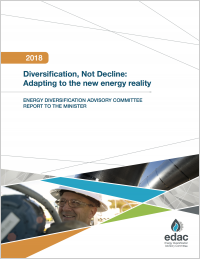Every day, on a global level, the world’s energy system moves to decarbonize — that is, move from fossil fuels to low carbon options. These are deliberate choices towards lower carbon outputs, impacting the entire landscape. Alberta needs to start planning for these realities because global trends hit home. How we react will govern whether our oil and gas industry has a valued place in a decarbonizing energy system, or is left behind as progress moves on.
 Yesterday, the Energy Diversification Advisory Committee (EDAC) released its recommendations to provincial Energy Minister Margaret McCuaig-Boyd. The EDAC recommendations focus on creating a prosperous future for Alberta’s oil and gas sector by increasing oil and gas production and diversifying the downstream side of the industry. Although the report forwards plans to further develop the industry by capturing more value for petrochemicals, it truly missed the opportunity to create a place for the industry in a carbon-constrained world and it's missed the opportunity to create a strategy to get our province to where the puck is going.
Yesterday, the Energy Diversification Advisory Committee (EDAC) released its recommendations to provincial Energy Minister Margaret McCuaig-Boyd. The EDAC recommendations focus on creating a prosperous future for Alberta’s oil and gas sector by increasing oil and gas production and diversifying the downstream side of the industry. Although the report forwards plans to further develop the industry by capturing more value for petrochemicals, it truly missed the opportunity to create a place for the industry in a carbon-constrained world and it's missed the opportunity to create a strategy to get our province to where the puck is going.
 Through an engagement process last spring EDAC gathered comments from stakeholders, including the Pembina Institute (see here for the Institute’s public submission to this process). The Pembina Institute repeatedly said Alberta needs to see our resources through a new lens, that of a rapidly decarbonizing world. If we simply create a strategy focused on expanding the current system and ultimately doing more of the same thing, then we may create short-term growth at the expense of the industry’s future viability.
Through an engagement process last spring EDAC gathered comments from stakeholders, including the Pembina Institute (see here for the Institute’s public submission to this process). The Pembina Institute repeatedly said Alberta needs to see our resources through a new lens, that of a rapidly decarbonizing world. If we simply create a strategy focused on expanding the current system and ultimately doing more of the same thing, then we may create short-term growth at the expense of the industry’s future viability.
More than 40 years ago Alberta undertook a similarly major investigation into how to kick start a strong energy sector. In the face of the oil shocks, rapidly growing global energy demand and American determination to gain a level of energy independence, then premier, Peter Lougheed saw what a thriving oilsands industry could do for Alberta.
In 1974, he established the Alberta Oil Sands Technology and Research Authority (AOSTRA) with a vision and a plan for Alberta resources. The government-funded agency was charged with accelerating oilsands technology development through innovation investments. We were looking for breakthrough ideas to make large-scale oilsands extraction commercially viable.
Over the course of its lifetime, AOSTRA spent $448 million on public–private projects, and was instrumental in developing in situ extraction technologies, including the now dominant steam-assisted gravity drainage technology.
To justify any more public investment in our oil and gas industry, Alberta needs a visionary strategy for its oil and gas resources in the context of disruptive and emerging changes that are in the near term for this industry. Taking up this challenge is not about finding ways to create marginal improvements and short-term growth. Peter Lougheed rejected this same path when he spearheaded AOSTRA. What we need is an equally well-resourced, government-supported program that re-imagines the production and end-use of our hydrocarbon resources. A true modern-day AOSTRA would conduct research to move the sector to zero-carbon innovations and non-combustion uses for our oil and gas resources.
Alberta’s challenge today is of the same magnitude as the one we faced in the 1970s when the oilsands were a fledgling new industry. It requires a similar effort in breakthrough innovation. It is time to re-invent our industry to ensure it continues to be an important contributor to Alberta and Canada’s economy, not merely look for ways to buy it a little more time. Because as EDAC’s report says, “time is of the essence.”








